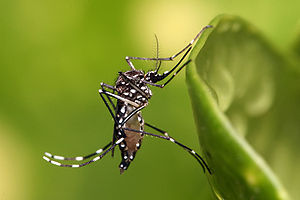
Responsible for as many as 46 billion deaths over the history of our species
War, plague, famine, heart disease, cigarettes, road trauma: six very effective killers of human beings. But they’re all amateurs when their records are compared to the number one mass murderer of all time. The humble mosquito, and the deadly diseases it carries, is estimated to have been responsible for as many as 46 billion deaths over the history of our species. That staggering number is even more frightening in context – it means that mosquitoes are alleged to have killed more than half the humans that ever lived.
So if any creature has earned the full force of the wrath of humanity, this nasty little bugger is it. Especially certain species like Aedes aegypti mosquitoes – the world’s number one disease vector for deadly dengue fever, which infects between 50 and 100 million people a year around the world.
A. aegypti has evolved into the most curious and innocuous of human predators – it’s the females that bite, and they more or less only feed on humans. Each bite exposes the victim to any blood-borne pathogens that the mosquito might have picked up along its way. Dengue and yellow fevers are among the most common – the mosquito contracts the virus by biting an infected victim, and then injects it along with its saliva when it stabs the next unlucky target’s skin with its proboscis.
A. aegypti flies silently, so it’s hard to know when you’re in danger of being bitten, and it breeds and multiplies extremely effectively, needing only a teaspoon full of standing water for its larvae to hatch.
DDT-based insecticides have been effective against these little blighters, but evolution is quickly building up their resistance to this and other control measures. Fighting them with poison might be effective in the short term, but in the long run it only makes them stronger.
There is, however, a potential solution that can hijack the mosquito’s breeding cycle to dramatically bring down the population and human risk factors. And it’s undergoing testing in two very different ways right now.
Bookmark this page for “mosquito diseases” and check back regularly as these articles update on a very frequent basis. The view is set to “news”. Try clicking on “video” and “2” for more articles.







